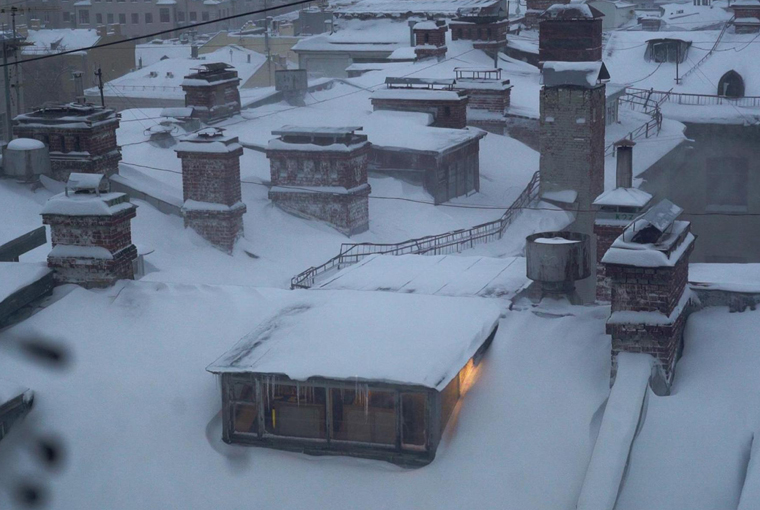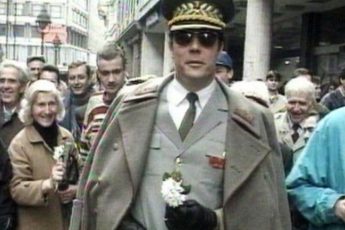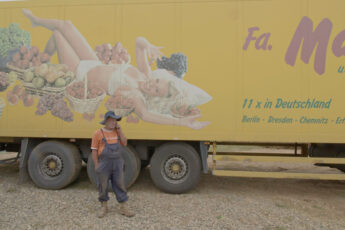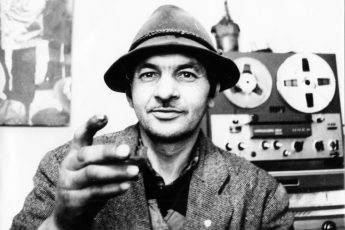How Do You Trade Your Native Hell for some Unearthly Paradise?
Masha Chernaya’s The Shards (Oskolky, 2024)
Vol. 152 (February 2025) by Colette de Castro
For more than two years Masha Chernaya documented her life in much the manner of a diarist, sharing both the mundane and the searingly painful with similar even-handedness. This footage was to become the 90-minute documentary The Shards. The film covers the first waves of Russian army conscription in 2022, the Wagner group plane crash in 2023, and the death of Alexei Navalny in 2024; all interspersed with musical interludes that often say more about people’s mood than the filmed conversations making up the core of the documentary. Whereas some use the camera to craft an emotional journey, here the emotion arrives spontaneously as time eats away at Masha’s relationships – there is no need for buildup.
The film’s title does a good job expressing at once the filming style of the director. The film often cuts rapidly from scene to scene and from city to city – Kaliningrad, Moscow, Tula. It tells the story of the fragmented remnants of Chernaya’s past and current life. Ultimately, it’s the story of a grieving process that begins with a mother and ends with a country.
Music is the unifying thread of this documentary. By featuring street musicians – from earnest brass bands accompanied by marching soldiers, to an endearing final scene in which a child makes music by dint of the train track vibrations – the photographer turned documentary-maker reveals the atmosphere in the streets of Russia in a way that no news report could ever do.
In Kaliningrad a young man sings a hymn to Russia on a plastic microphone which interrupts him halfway through his song to announce – in English – that the battery is running low. Walking along the seafront Masha’s lens comes upon a brass band and zooms in on a man enthusiastically playing the trombone. These seaside entertainers could almost be read as a hopeful response to Putin’s announcement that he would bring back the Intervision song contest – what had been the URSS’s answer to Eurovision – if it weren’t that this footage pre-dates that announcement made in 2025.
In Moscow the music scene is underground and decidedly grungier. Three performers scream over grinding heavy metal and the sound of a chainsaw, “Russia, Russia, Russia, the weak ones are fucked here, fucked here for sure.” A different rock band has a girl dressed as a cat tied to a heavy linked chain who throws herself against the floor as the music rages behind her. She looks more like a familiar than a fetishist, but no matter: the whole room of young people is vibing with the way she writhes around the floor, giving control to the music and the keyboardist holding the leash. What she brings out in the audience is feral: unnamed rage pulling helplessly against hot metal.
Surreptitiously filming friends she meets in Moscow having conversations over drinks – the camera’s focus often drifts away – a woman of about 20 argues the case for living as best she can and not thinking about the war. “Throughout history,” she says, “life has been shit and discussing shit is pointless, stupid, and void.” Soon after this, the group stops talking about the war and the camera switches off too. This desire not to talk about the war is often echoed in public places, but closer to home Masha is having important conversations. Her mother is dying and her boyfriend is leaving the country to escape the draft.
In the streets, she’s careful about what she turns her camera towards and where she holds it on her body. Sometimes the audience can tell that she is not holding it at eye level, but at chest or hip level. This hesitation to be seen filming in public is understandable given the situation; at one point she argues with security guards in a food court who say she should not be filming without authorization. Following the camera around her body creates a physical, almost palpable sensation for the audience. It makes us feel as if we are almost there with the filmmaker.
Not long into The Shards, Masha Chernaya turns the camera onto herself. We see her in the lift, the stairwell, the bedroom. All these are places where she is unafraid to film. It’s through these scenes that we realize how much she loves her country. Of course, we are in Russia, so it’s subtle. The closest thing to a declaration of love comes through in the form of irony – in one scene she chats with a person filming her who tells her she’s thinking about moving to India where her sister lives. Without missing a beat, Masha rebuffs, “It’s for hippies who live barefoot near the beach, smoke endlessly, and don’t seem to have any sources of income… How do you trade your native hell for some unearthly paradise?”
This love shows through in the way she lingers in Moscow despite the difficulties and emotional pain, and how she manages to tolerate proximity to people whose ideas are repulsive to her, filming them with the same care with which she films her friends. It shows in how she includes music in her film, following musicians playing live, their songs rising above the mutters and murmurs of the hawkish self-flattery heard elsewhere in the streets.
With the eye of both a photographer and a poet, Chernaya has a knack for spotting potential subjects. In one scene, a youngish-looking man breaks away from a group of people – what looks to my foreign eye to be a people’s parade to support the army. Brandishing a huge Russian flag, he seems threatening as he chants war slogans. Gradually, we realize he is also very drunk. Some nameless current passes between the filmmaker and the man as the words start to spill out of him; he changes before our eyes from this staunch soldier into a little boy. “They’ll draft anyone, even people with a condition.” He then flings the flag onto the ground and turns his back on it. This talent to bring something out in people and places is what makes Masha Chernaya a filmmaker to watch: wherever in the world she ends up.




Leave a Comment